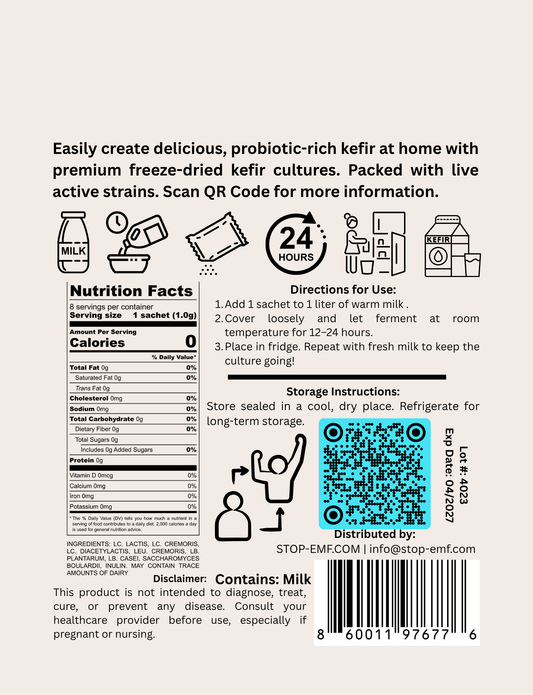Kefir, a fermented dairy or non-dairy beverage, has been gaining popularity in recent years as a health-conscious alternative to traditional yogurt. This probiotic-rich drink offers a unique flavor profile and a host of potential benefits, making it a versatile addition to any wellness routine. In this blog post, we'll dive into the world of kefir, exploring the various types, their distinct characteristics, and the reasons why this fermented elixir deserves a place in your daily routine.
The Origins of Kefir
Kefir's origins can be traced back to the Caucasus Mountains, where it has been a staple in the diets of the region's inhabitants for centuries. The name "kefir" is derived from the Turkish word "keyif," which means "good feeling," a nod to the drink's purported health benefits.
The traditional method of making kefir involves fermenting milk with kefir grains, which are a symbiotic colony of bacteria and yeast. These grains act as a natural starter culture, transforming the lactose in the milk into a slightly effervescent, tangy, and creamy beverage.
Milk Kefir: The Classic Variety
Milk kefir is the most well-known and widely available type of kefir. Made by fermenting cow, goat, or sheep's milk, this probiotic-rich drink offers a unique flavor profile that can range from tart and tangy to smooth and creamy, depending on the fermentation time and the specific kefir grains used.
Milk kefir is a rich source of beneficial bacteria, including Lactobacillus, Streptococcus, and Bifidobacterium, as well as various yeasts. These microorganisms work in harmony to break down the lactose in the milk, resulting in a beverage that is often easier to digest than traditional dairy products.
Water Kefir: A Dairy-Free Alternative
For those looking for a dairy-free option, water kefir is a fantastic alternative. Instead of milk, water kefir is made by fermenting a sugar-water solution with kefir grains. The resulting drink is slightly effervescent, with a flavor profile that can range from sweet to tart, depending on the length of fermentation and any added fruits or juices.
Water kefir is an excellent source of probiotics, as the fermentation process cultivates a diverse array of beneficial bacteria and yeasts. It's a great choice for individuals who are lactose-intolerant or following a vegan or plant-based diet.
Coconut Kefir: A Tropical Twist
For those seeking a dairy-free and tropical twist on traditional kefir, coconut kefir is a delightful option. This unique variation is made by fermenting coconut water or coconut milk with kefir grains, resulting in a refreshing and creamy beverage.
Coconut kefir is not only a probiotic powerhouse but also rich in medium-chain triglycerides (MCTs), which have been linked to various health benefits, including improved digestion and increased energy levels. The combination of probiotics and MCTs makes coconut kefir a truly versatile and nourishing choice.
Goat Milk Kefir: A Gentle Alternative
For individuals who may have difficulty digesting cow's milk, goat milk kefir can be a gentler and more easily tolerated option. Goat milk is naturally lower in lactose and contains smaller fat globules, making it more easily digestible for some people.
Goat milk kefir retains the same probiotic benefits as its cow's milk counterpart, but with a slightly tangier and creamier flavor profile. It's an excellent choice for those looking to diversify their dairy intake or incorporate more gut-friendly options into their diet.
Almond Milk Kefir: A Dairy-Free Delight
For those following a plant-based or dairy-free lifestyle, almond milk kefir offers a delicious and nutritious alternative. This non-dairy kefir is made by fermenting almond milk with kefir grains, resulting in a creamy, probiotic-rich beverage.
Almond milk kefir is not only a great source of probiotics but also rich in healthy fats, vitamins, and minerals. It's a fantastic option for individuals who are lactose-intolerant or prefer to avoid dairy products, while still enjoying the benefits of a fermented, gut-friendly drink.
Exploring Kefir Flavors and Variations
One of the joys of kefir is the endless possibilities for customization and experimentation. Beyond the classic varieties, kefir can be infused with a wide range of fruits, herbs, and other flavorings to create unique and delightful taste experiences.
From strawberry and vanilla to ginger and turmeric, the options for kefir flavors are truly limitless. Some enthusiasts even venture into the realm of kefir-based smoothies, combining the probiotic-rich drink with fresh or frozen fruits, nut butters, and other nutrient-dense ingredients.
The Health Benefits of Kefir
Kefir's popularity as a health-conscious beverage is well-deserved. This fermented elixir is packed with a diverse array of probiotics, which are essential for maintaining a healthy gut microbiome. Consuming kefir regularly can help support digestive function, boost the immune system, and even contribute to improved mental well-being.
Additionally, kefir is a rich source of essential vitamins and minerals, including calcium, vitamin B12, and riboflavin. These nutrients play a crucial role in supporting bone health, energy production, and overall bodily function.
Kefir vs. Yogurt: A Comparison
While both kefir and yogurt are fermented dairy products, they differ in several key ways. Kefir typically contains a more diverse array of probiotics, including strains that are not commonly found in traditional yogurt. Additionally, kefir is often lower in lactose and has a slightly effervescent, tangy flavor profile that sets it apart from the creamier, milder taste of yogurt.
For individuals looking to diversify their probiotic intake or explore new and exciting fermented beverages, kefir presents a compelling alternative to the more familiar yogurt.
Incorporating Kefir into Your Routine
Incorporating kefir into your daily routine is a simple and effective way to support your overall health and well-being. Whether you enjoy it as a refreshing beverage, incorporate it into smoothies, or use it as a base for dips and dressings, kefir's versatility makes it an easy addition to any diet.
As with any new food or beverage, it's important to start slowly and listen to your body's response. Some individuals may experience temporary digestive discomfort as their gut microbiome adjusts to the influx of probiotics. If this occurs, gradually increase your kefir consumption to allow your body to adapt.
Conclusion
Kefir is a remarkable fermented beverage that offers a wealth of potential health benefits. From the classic milk kefir to the dairy-free variations, each type of kefir presents a unique flavor profile and set of nutritional advantages. By exploring the diverse world of kefir, you can not only nourish your gut but also expand your palate and discover new ways to support your overall well-being.
So, whether you're a seasoned kefir enthusiast or new to the world of fermented drinks, dive in and embark on a journey of probiotic discovery. Your gut, and your taste buds, will thank you.






